30 min listen

How to Go Faster and Feel More Energetic By Addressing Anaemia and Increasing Oxygen Deliverability
How to Go Faster and Feel More Energetic By Addressing Anaemia and Increasing Oxygen Deliverability
ratings:
Length:
61 minutes
Released:
May 7, 2021
Format:
Podcast episode
Description
Anaemia is an incredibly common blood condition in which you lack enough red blood cells - or haemoglobin within them - to adequately deliver and supply oxygen to the body’s tissues. Worldwide, children and pregnant women are disproportionately affected, though we’ve had a number of clients benefit from lifestyle changes aimed at increasing haemoglobin. And I can tell you from personal experience, anaemia can have a measurable impact on athletic performance. On this podcast, NBT Scientific Director Megan Hall and I are talking about low oxygen deliverability resulting from anaemia and the many factors that can lead to this condition. We discuss in detail the blood tests that suggest anaemia is affecting your health, along with science-based optimal reference ranges for the most important markers. Megan also details steps you can take to improve your oxygen deliverability status if your haemoglobin is low (and taking an iron pill is not always the answer!). There’s a ton of great information in this one, so be sure to follow along with the outline Megan wrote to prepare for the podcast. Here’s the outline of this interview with Megan Hall: [00:03:07] What is oxygen deliverability? Background and physiology. [00:05:00] Anaemia. [00:07:00] Why care about haemoglobin? [00:07:02] Haemoglobin's effect on athletic performance. [00:09:56] Causal relationship between iron deficiency anaemia and aerobic capacity; Review: Haas, Jere D., and Thomas Brownlie IV. "Iron deficiency and reduced work capacity: a critical review of the research to determine a causal relationship." The Journal of nutrition 131.2 (2001): 676S-690S. [00:11:06] Haemoglobin and anaerobic threshold. [00:12:10] Study of speed skaters: Kuipers, Harm, et al. "Hemoglobin levels and athletic performance in elite speed skaters during the olympic season 2006." Clinical Journal of Sport Medicine 17.2 (2007): 135-139. [00:12:16] Megan's outline for this podcast. [00:13:51] Fatigue and energy levels. [00:14:33] Anaemia and quality of life issues. [00:15:46] Anaemia during pregnancy. [00:16:38] Potential causes of anaemia. [00:30:14] Malcolm Kendrick podcast discussing sickle cell anaemia and endothelial damage: A Statin Nation: Damaging Millions in a Brave New Post-health World. [00:32:25] "Sports anaemia" ("pseudoanaemia"); Studies: 1. Eichner, E. RANDY. "Sports anemia, iron supplements, and blood doping." Medicine and science in sports and exercise 24.9 Suppl (1992): S315-8; 2. Weight, L. M., et al. "‘Sports Anemia’-A Real or Apparent Phenomenon in Endurance-Trained Athletes?." International journal of sports medicine 13.04 (1992): 344-347. [00:33:55] How to tell if it's a true anaemia: history, diet, symptoms, blood chemistry. [00:34:16] Occult blood testing: test on 3-4 consecutive days. [00:37:02] Blood chemistry markers that can reveal anaemia. [00:40:54] Elevated MCV in athletes. (elevated = greater than 92 fL); Studies supporting reference range: 1. Anderson, Jeffrey L., et al. "Usefulness of a complete blood count-derived risk score to predict incident mortality in patients with suspected cardiovascular disease." The American journal of cardiology 99.2 (2007): 169-174 and 2. Mueller, Thomas, et al. "Association between erythrocyte mean corpuscular volume and peripheral arterial disease in male subjects: a case control study." Angiology 52.9 (2001): 605-613. [00:43:55] Haemoglobin - optimal reference ranges: 13.0 - 14.5 g/dL (women) and 14.5 - 16 g/dL (men); Study supporting reference range: Fulks, Michael, Vera F. Dolan, and Robert L. Stout. "Hemoglobin Screening Independently Predicts All-Cause Mortality." (2015): 75-80. [00:44:22] Elevated haemoglobin and sleep apnea. [00:45:23] Red blood cells (RBC) - optimal reference ranges: 4.4 to 4.8 m/cumm (women) and 4.8 to 5/5 m/cumm; Study: Kim, Yong Chul, et al. "The low number of red blood cells is an important risk factor for all-cause mortality in the general population." The Tohoku journal of experimental medicine
Released:
May 7, 2021
Format:
Podcast episode
Titles in the series (100)
Paleo Psychology with Ashley Mason PhD: is a clinical psychologist and research fellow at UCSF. Her primary research interests focus on food-craving experiences, stress-induced eating, and reward-based eating. She is currently using ecological momentary assessment (EMA) methodologies... by Nourish Balance Thrive